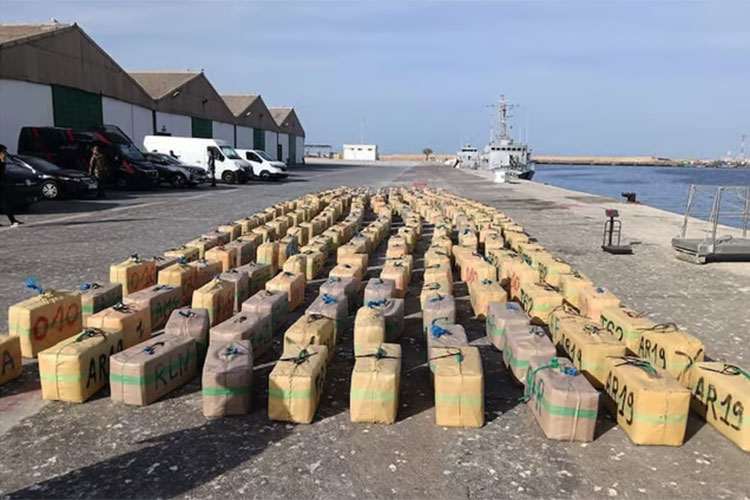Moroccan Authorities Involved With Drug Lords

The Spanish media have revealed the extent to which the Moroccan authorities are collaborating with drug barons to flood Spain with hashish, denouncing Rabat’s ignoring of the Spanish government’s requests to put an end to this trade, which threatens the security of the region.
The newspaper Espanol reported in an article that the Royal Moroccan Navy was collaborating with drug lords to smuggle “prohibited substances” into Spain.
The Spanish newspaper published “exclusive” photos from a smuggler’s cell phone that it said showed a Moroccan navy boat involved in transporting drugs and directing smugglers’ boats.
The leadership of the Spanish Guardia Civil criticized Morocco’s lack of willingness to cooperate with the Spanish authorities, stressing that “this is not the first time that the Moroccan authorities have ignored all Spanish requests to investigate issues related to the smuggling of these poisons.”
Spanish media reports pointed out that the images revealed by the newspaper “Español,” which showed the extent of Morocco’s involvement in facilitating the transport and distribution of toxic substances to Spain via a Moroccan navy boat loaded with hashish, “represent only the beginning of the tip of the iceberg,” and that what was hidden was much greater.
The newspaper wrote that the widespread phenomenon of corruption and collaboration between the Moroccan authorities and hashish traffickers in the Strait is an “open secret,” stressing that “corruption within the Royal Navy and the Moroccan Gendarmerie is systemic.
Citing specialists from the National Police and the Guardia Civil, the newspaper said: “With the decline in salaries for army personnel in Morocco, everyone is at risk of falling into drug networks” in order to obtain additional financial income.
The police officer, an expert in security matters, confirmed that this discovery “is not the first of its kind, but on many occasions the complicity of corrupt members of the Moroccan police or army in drug smuggling operations has been discovered and proven”.
As the world’s largest producer of cannabis, the reports added that “the ability of drug traffickers to infiltrate Moroccan state institutions is clear,” but they stressed that this matter “would not have happened without the cooperation or inaction of agents and security forces in this country.
The Spanish media also criticized Morocco’s policy in dealing with these issues, stressing that it “continues its policy of turning a deaf ear to Spain and the European Union, despite the millions of dollars it receives in European aid to coordinate the fight against drug trafficking”.
In this context, the newspaper “Espanol” cited Morocco’s ignoring of recent Spanish demands to extradite to the Spanish authorities one of the biggest drug barons in Morocco, known as the “Messi of Hashish”, since he is one of those responsible for turning the region into a gateway for the transit of these poisons to Europe.
According to the Spanish police officer interviewed by the Spanish newspaper, it was possible to determine exactly where this smuggler was hiding. Despite all the accurate information they provided, Morocco has repeatedly ignored official requests for his extradition and there is no plan to confront him in the Kingdom.
The sources added: “We traveled to Morocco, where we met with the Moroccan authorities and gave them all the information we had gathered, even photos of what the house looked like, but at the end of the day, Morocco is Morocco”.
Spain is considered the gateway for drug smuggling from Morocco to Europe, and its shores have recently witnessed an armed attack by a group of smugglers near the coast of the Barbati region in the south of the country last month, which resulted in the death of two members of the Spanish Civil Guard.
Morocco continues to use drugs, along with illegal immigration, as a weapon to blackmail Spain for political and diplomatic gain, despite the fact that the European Parliament condemned this blameworthy behavior in a regulation approved in June 2021.




